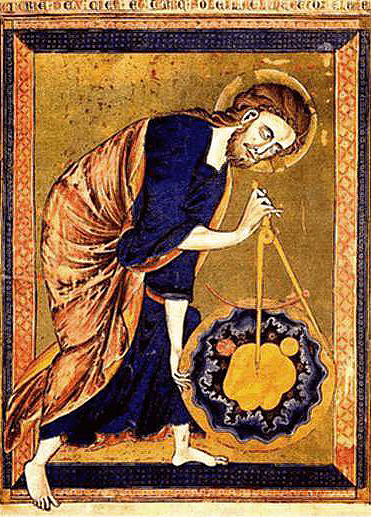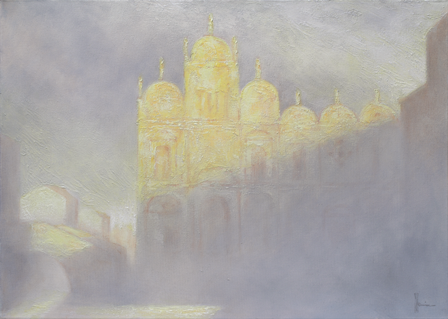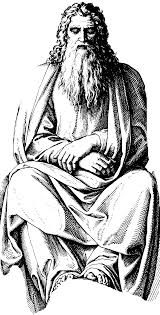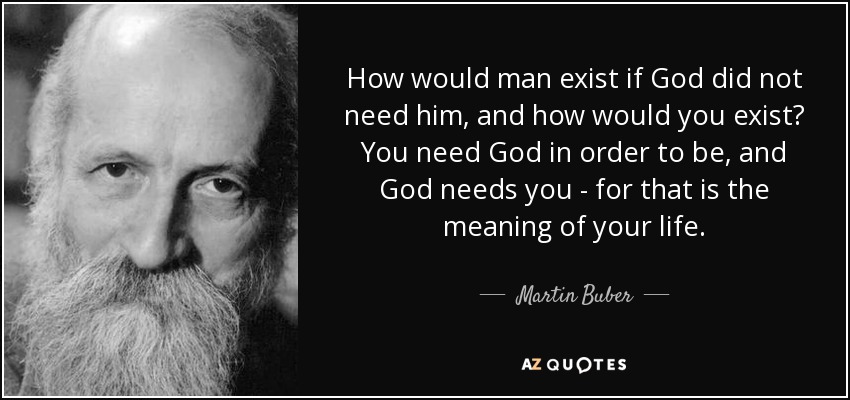
Hawkins / Gott
Inhaltsverzeichnis: (verbergen)

God as Architect/Builder/Geometer/Craftsman |
|
Gott ist das Nichts, das alles werden will. |
Deutschland
Eine EMNID-Umfrage von 1996 ergab, dass nur noch 45 Prozent der Deutschen "an Gott glauben", die übrigen sahen sich als Agnostiker ("weiß es nicht") oder Atheisten ("glaube nicht an Gott"). 1992 waren noch 50 Prozent der Westdeutschen gottgläubig gewesen. Dies sind abweichende Daten von den statistischen Erhebungen des Internationalen Bundes der Konfessionslosen und Atheisten (IBKA) zur Konfessionszugehörigkeit in Deutschland 1970-2002.
Bei einer Umfrage Ende 2022 gaben rund 19 Prozent der Teilnehmenden an, dass sie glauben, dass es einen Gott gibt, der sich als Jesus Christus zu erkennen gegeben hat. 29 Prozent gaben wiederum an, keinen konkreten Glauben an einen bestimmten Gott zu haben, allerdings an ein unbestimmtes höheres Wesen bzw. geistige Macht zu glauben. Mit einem Anteil von 33 Prozent der Befragten, war ein Großteil der Befragten überzeugt, dass es keine höhere Macht oder kein Gotteswesen gäbe. 20 Prozent waren sich in ihrem Glauben unsicher und wussten nicht richtig, was sie glauben sollten. Statista Forschungsabteilung, veröffentlicht 6. März 2024
Vereinigte Staaten von Amerika
Nach einer im März 2009 veröffentlichten repräsentativen Umfrage unter 54.461 Amerikanern sahen sich 76 Prozent der
US-Bürger als Christen ein. 15 Prozent bezeichneten sich als Nichtgläubige.
1990 gab es 86 Prozent Christen und 8,2 Prozent Nichtgläubige in den Vereinigten Staaten.

GOTT, der Schöpfer, der sich in der evoluierenden Schöpfung aus-
drückt, ist eine absolute Konstante, unveränderlich-veränderlich. Die menschliche Erfahrung der An-Wesenheit Gottes ist in allen Zeital-
tern, kulturellen Gegebenheiten und an allen Orten gleichbleibend.
In Das All-sehende Auge, Kapitel 10 Die Natur GOTTES und in Licht des Alls. Die Wirklichkeit des Göttlichen, 23 Aussagen über GOTT
sind direkte, klare Aussagen über GOTT zu finden, deren Trefflichkeit jeweils mit Gruppen von cirka 100 kinesiologischen Testpaaren be-
stätigt (nachgemessen) wurde.
Einer der schnellsten Wege zu Gott ist, einem plötzlichen Tod ins Auge zu sehen. Fast alle Überlebenden von Katastrophen berichten, dass sie gebetet haben.
Gott ist transzendent-immanent, ein Paradox für den gespaltenen Verstand.
Im Laufe der Evolution verschieben sich die projizierten Gottesbilder der Menschen.
Gottesbilder drücken aus, welche Art von Zugang dem Menschen zum SELBST, zu Allem-was-ist, zur Verfügung steht.
Die Gottesbilder stammen aus dem Selbstverständnis des Ids, des Egos, des Selbstes und des SELBSTes.
Sie sind repräsentativ für unterschiedliche Stufen der Evolution:
| |||||||||||||||||||||||||||||||||||||||||||||||||||||||||||||||||||||||||||||||||||||||||||||||||||||||||||||||||||||||||||||||||||||||||||||||||||||||||||||||
| Siehe auch: ► Bewusstseinsebenen |
Gurdjeff ließ seine Schüler obigen Satz in Geheimschrift an die Wand ihres Übungsraums schreiben.
Hawkins sagt, dass es von großer Bedeutung ist, zu wissen, was GOTT nicht ist, da in der Menschheitsgeschichte Völker und Nationen infolge von unzutreffenden Gottesbildern in die Irre geführt oder gar ausgelöscht worden sind. Laut Hawkins ist das kinesiologiche Testen von Wahrheitsebenen ein wertvolles Werkzeug zur Unterscheidung (der Geister).
| Quellen: ► D. Hawkins, Das All-sehende Auge, Kapitel 10 "Die Natur Gottes GOTTES", 2005 Licht des Alls. Die Wirklichkeit des Göttlichen, 23 Aussagen über GOTT, 2006 |
| Quellen: ► D. Hawkins, Das All-sehende Auge, Kapitel 10 "Die Natur Gottes GOTTES", 2005 Licht des Alls. Die Wirklichkeit des Göttlichen, "23 Aussagen über GOTT", 2006 |
| Gott sprach zu Mose: »Ich bin, der ich bin!« | 2. Mose 3, 14 (AT) |
| Gott ist Geist, und die ihn anbeten, müssen ihn im Geist und in der Wahrheit anbeten. | Johannes 4, 24 (NT) |
| Gott ist Licht. | 1. Johannes 1, 5 (NT) |
| Gott ist Liebe; und wer in der Liebe bleibt, der bleibt in Gott und Gott in ihm. | 1. Johannes 4, 16 (NT) |
| Ich bin das Alpha und das Omega, spricht der Herr, Gott, der ist und der war und der kommt, der Allmächtige. | Offenbarung 1, 6 (NT) |
| O Tiefe des Reichtums, der Weisheit und der Erkenntnis Gottes! Wie unergründlich sind seine Entscheidungen, wie unerforschlich seine Wege. Denn wer hat die Gedanken des Herrn erkannt? Oder wer ist sein Ratgeber gewesen? Wer hat ihm etwas gegeben, so dass Gott ihm etwas zurückgeben müsste? Denn aus ihm und durch ihn und auf ihn hin ist die ganze Schöpfung. Ihm sei Ehre in Ewigkeit! Amen. | Römer 11, 33-36 (NT) |
| Quelle: ► D. Hawkins, Licht des Alls. Die Wirklichkeit des Göttlichen, zehn FU Beispiele aus Kapitel 10 "Die Natur Gottes", Untertitel "23 Aussagen über Gott", S. 233-236, 2006 |
|
Aus der auffälligen Inaktivierung des Orientierungs-Assoziations-Areals (OAA), die während der Meditation zu beobachten ist, hat Dr. Andrew Newberg den Schluss gezogen, dass im Moment höchster religiöser Versenkung die Grenze zwi- |
| Quelle: ► Thomas M. Schmidt (*1960) deutscher Philosoph, römisch-katholischer Theologe, Horst Schmidt Klinik Wiesbaden Abteilung Neurochirurgie, Gott im Gehirn, Juni 2009 |
| Referenz: ► Artikel von Thomas M. Schmidt (*1960) deutscher Philosoph, römisch-katholischer Theologe, Silke Lechtenböhmer, Gott als Produkt der Hirnaktivität, präsentiert von der Publikation Herder Korrespondenz, 62. Jahrgang, Heft Spezial 2, S. 60-64, 2008 |
| Siehe auch: ► Neurowissenschaft |
Persönliche Bekenntnisse
I. Reality and Subjectivity, chapter 10 "Reality of Divinity", subheading "23 Statements on God", S. 163-164, 2003
I. Reality and Subjectivity, paragraph 1, S. 4, 2003
Persönliche Bekenntnisse
Leitspruch des "Atheismus im Namen der Vernunft"
Empfehlungen

In sehr seltenen Fällen bewirken große Ideen nach sehr langer Zeit des Meditierens oder des Betens eine Assymetrie des Thalamus.
|
Literaturzitate
Jean-Paul Sartre [BW 200] als Ausgangspunkt seiner Version des Existentialismus [BW 375].
Personal avowals

Bill Griffith Wilson (1895-1971) and Robert Holbrook Smith (1879-1950) known as Dr. Bob, started the fellowship of Alcoholics Anonymous (AA). The main concern of AA is to surrender one's addiction / life to a Higher Power / God.

The proper role of the humble civil leader is to serve as a conduit and steward of Divine power.
|
Literary quotes
God is transcendent-immanent, a paradox for the split mind.
The God images projected or held by men represent different stages of evolution.
These projections directed to God express what is presently available to the individual.
The drive to access All-There-Is [God] may derive from the Id, the ego, the self, the SELF.
During the human evolution through shifting stages of consciousness people feel triggered to project/perceive
following God images in their imagination:
| ||||||||||||||||||||||||||||||||||||||||||||||||||||||||||||||||||||||||||||||||||||||||||||||||||||||||||||||||||||||||||||||||||||||||||||
| Reference: ► Removed chart and comments The 10,000 Levels of Consciousness, presented by the dissolved mayancalendar4u, undated |
| |||||||||||||||||||||||||||||||||||||||||||||||||||||||||||||||||||||||||||||||||||||||||||||||||||||||||||||||||||||||||||||||||||||||||||||||||||||||||
|
To think about God is for the human soul what breathing is for the human body. First sentence (revelation)
The proof for the existence of God is the existence of people who are inhabited by and who manifest God.
What matters is that we are deeply and authentically concerned with questions of ultimate reality and ultimate value. It only matters that we are called to try to be honest and deep and good in our thought and life. [...]
If we lose all contact with this inner God element [the vibration of the soul] in ourselves, the wordless year- ning to serve the good and know the truth, our thoughts and our actions will lead us nowhere. Our thoughts will lead us either to cynicism or to an absurd overestimation of our own mental powers. [...]
This heartless way of thinking about God and Ultimate Reality dominates the mind of the contemporary world.
For God or against God, belief or atheism, it makes no difference unless the inner yearning is there. And it can so easily be there, just as it can be so easily be covered over and ignored, perhaps for the rest of one's life.
God or not God, belief or science, it also makes no real difference for my personal life unless the call of the Great Self and its need to breathe is heard and ultimately respected.
Not only can thought about Ultimate Reality make no difference to the world or to my personal life unless we hear and respect the call of the Self but such empty thought can bring down our personal and collective world, even our Earth itself. When thought races ahead of being a civilization is racing toward destruction.
|
|
Dr. Carl Jung stated that there are two Gods, a God of Heaven and a God of Earth, who are one and the same.
Gottesbilder (Stufen) – Menschentypen
Names and aspects of God
Englische Werke
Links zum Thema Gott / GodLiteratur
Literature (engl.)
1. Authoritarian God, 2. Critical God, 3. Distant God –– God images of 72% of the North Americans Externe Weblinks
Teils zitiert aus: Ernst Frankenberger, "Gottesbekenntnisse großer Naturforscher", Katholische Schriftenmission, Leutesdorf/Rhein, 11. Auflage 1979
Empirische Konstitutionsbedingungen von Religion und die psychologischen Konstellationen nach den neuesten neurowissenschaftlichen Erkenntnissen interpretiert werden müssen. Die Befunde der Neurotheologie ermöglichen eine pro- wie eine antireligiöse Deutung.
Gottesbilder aus der Perspektive der 1., 2. und 3. Person
Linklose Artikel
Über Frieden, Gewaltlosigkeit und Pazifismus nach dem 11. September
External web links (engl.)
God viewed from the 1st, 2nd and 3rd personal perspective (face)
Linkless articles
Audio- und VideolinksLinklose Audios/Videos
Audio and video links (engl.)
Science dealing with the answers of mystics
Music and movie links (engl.)
|
Wiki-Ebene
1 Das All-sehende Auge, S. 223, 2005 ⇑
2 Paul of Tarsus, 1. Corinthians 13, 12 (NT) ⇑
3 1. John 3, 2 (NT) ⇑
4 I. Reality and Subjectivity, "Enlightened and Divine States", S. 151-152, S. 367-368, 2003 ⇑
5 I. Reality and Subjectivity, S. 367, 2003 ⇑
6 I. Reality and Subjectivity, S. 367, 2008 ⇑